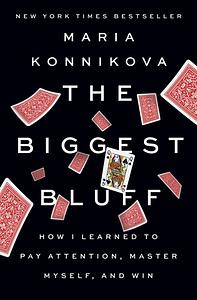Take a photo of a barcode or cover
367 reviews for:
The Biggest Bluff: How I Learned to Pay Attention, Master Myself, and Win
Maria Konnikova
367 reviews for:
The Biggest Bluff: How I Learned to Pay Attention, Master Myself, and Win
Maria Konnikova
I´m not a poker fan - or even know the entirety of the rules of the game for that matter - but I still thought it was one of the best non fiction books I´ve read in the last few years. Maria is such an interesting and clever person, her whole ordeal with learning to play and going to tournaments, her insights on the game and life combined with her knowledge of Psychology are just incredible. I had to switch from audio format to print edition so I could make notes. The Poker Starts stories are a treat for the curious and if it wasn´t for a pandemic, I might have booked tickets to visit Vegas.
Really fun read even with no prior knowledge of poker. Lots of great lessons on strategy, confidence, and reading other people
informative
slow-paced
funny
informative
inspiring
lighthearted
reflective
medium-paced
informative
reflective
medium-paced
If your goal is to learn about decision making tools or frameworks, there are books that are way better than this one. The main reason anybody should read this is if you’re interested in following a persons career in Poker going from zero to hero, it reads more as a journalistic approach to the world of betting and gambling than an actual psychology book. The learnings, analogies and conclusion felt forced into what the writer was experiencing as a poker player.
I throughly enjoyed this book. It caused me to pause and evaluate my own problem-solving skills and shift my perspective away from emotion-based decisions (for someone who believed herself to be a rational/logical person already--this was a revelation). It is a case study on decision making and human behavior through the lens of Texas Hold 'Em Poker. In the prelude, Konnikova writes: "That's the thing about life: You can do what you do but in the end, some things remain stubbornly outside your control. You can't calculate for dumb bad luck. As they say, man plans, God laughs."
Through the course of learning the game and rising to pro-level competition, Konnikova explores our tendency to stay the course, often ignoring new information that should cause us to reevaluate our decisions; the need to be observant of your circumstances before making any decision; and the need for flexibility in both short-term decision making and executing more longterm plans. What I found particularly interesting was Konnikova's own struggle to implement what she had learned and how she fell victim to her emotions at times despite her PhD in psychology!
The book was enlightening, thought-provoking and worth a second read.
Through the course of learning the game and rising to pro-level competition, Konnikova explores our tendency to stay the course, often ignoring new information that should cause us to reevaluate our decisions; the need to be observant of your circumstances before making any decision; and the need for flexibility in both short-term decision making and executing more longterm plans. What I found particularly interesting was Konnikova's own struggle to implement what she had learned and how she fell victim to her emotions at times despite her PhD in psychology!
The book was enlightening, thought-provoking and worth a second read.
As the lockdown and our quarantines have proceeded, I've found myself scrambling in search of ways to keep myself and everyone else at home entertained, and that's when we stumbled upon poker. Soon enough, Friday became the designated poker night - everyone huddled around the table trying to figure what is behind their opponent's poker face.
It was immediately apparent to me that poker is also very much a game of skill, as much as it is a game of chance. In a lot of ways, poker emulates a lot of characteristics of life. There are a number of cards that you are dealt with, and what determines your success is how well you play those cards. Sure, you could be dealt with great cards, but that is in no way a determinant of your success.
In The Biggest Bluff, Maria Konnikova traces her journey to the World Series of Poker (WSOP) tournaments. Armed with a background in psychology, Konnikova is able to analyse her decisions, and everyone else's, at the table, and draws quite a few interesting conclusions from them, attributing them not to personality quirks but to cognitive biases. Often at times a meditation on the synergy of cognition, decision-making and emotional intelligence, The Biggest Bluff makes for an interesting memoir of an outlier's journey to poker stardom.
It was immediately apparent to me that poker is also very much a game of skill, as much as it is a game of chance. In a lot of ways, poker emulates a lot of characteristics of life. There are a number of cards that you are dealt with, and what determines your success is how well you play those cards. Sure, you could be dealt with great cards, but that is in no way a determinant of your success.
In The Biggest Bluff, Maria Konnikova traces her journey to the World Series of Poker (WSOP) tournaments. Armed with a background in psychology, Konnikova is able to analyse her decisions, and everyone else's, at the table, and draws quite a few interesting conclusions from them, attributing them not to personality quirks but to cognitive biases. Often at times a meditation on the synergy of cognition, decision-making and emotional intelligence, The Biggest Bluff makes for an interesting memoir of an outlier's journey to poker stardom.

